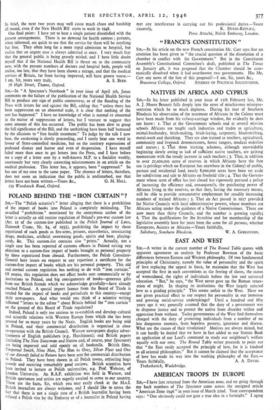EAST AND WEST
SIR,—A writer in the current number of The Round Table quotes with apparent agreement an analysis by Professor Bowman of the basic differences between Eastern and Western philosophy. Of two fundamental principles of Christianity, namely the value of personality and the spirit of love replacing the appeal to force, he maintains that the West has accepted the first in such conventions as the freeing of slaves, the status of womanhood, the rights of individuals before the law and universal education. " But," he says, " the West never gave up the Roman vener- ation of might. In shaping its institutions the West largely rejected love as a guiding principle." This seems unfair to the West. Have we not given practical effect to our respect for personality in our immense and growing social-service undertakings? Until a hundred and fifty years ago it was generally assumed that the duty of a government was to dispense justice and to protect the native from disorder within and aggression from without. Today governments of the West find themselves charged with the duty of protecting individuals from a number of no less dangerous enemies, from hopeless poverty, ignorance and disease. What are the causes of their revolution? Motives are always mixed, but it can hardly be denied that we have in fact added to our Statute Book an application of our Lord's command to study our neighbour's welfare equally with our own. The Round Table writer proceeds to point out that "the East easily accepted the principle of love, for it is kindred to all oriental philosophies." But it cannot be claimed that the acceptance of love has made its way into the working philosophy of the East.—


























 Previous page
Previous page